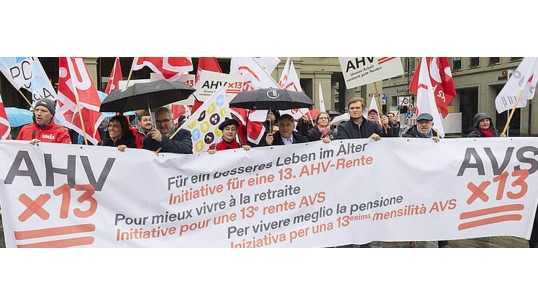- Topics
- Campaigning
- Careers
- Colleges
- Community
- Education and training
- Environment
- Equality
- Federation
- General secretary message
- Government
- Health and safety
- History
- Industrial
- International
- Law
- Members at work
- Nautilus news
- Nautilus partnerships
- Netherlands
- Open days
- Opinion
- Organising
- Podcasts from Nautilus
- Sponsored content
- Switzerland
- Technology
- Ukraine
- United Kingdom
- Welfare

On 3 March, voters in Switzerland rewarded the hard graft of workers including maritime professionals in a referendum on increasing old age pension provision. Holger Schatz explains
Rents, health insurance premiums, electricity, public transport: in Switzerland, rising prices have eaten up an entire month's pension since 2021 through inflation.
In the face of this cost of living crisis, a broad alliance of unions, parties and pensioners' organisations in Switzerland have been working on the voting campaign for the referendum on the '13th AHV pension'.
The 13th AHV pension compensates for the loss of purchasing power for all current and future pensioners. It is the most cost-effective and efficient solution to combat pensions that are too low.
As well as Swiss citizens, all non-voters without a Swiss passport who have worked – or are still working – under a Swiss employment contract and live abroad will also receive the extra month's pension payment. That means a large proportion of Nautilus members in inland navigation!
On 3 March, we had fantastic news: 58% of those who participated in the referendum voted in favour of the initiative, which was largely initiated by our trade union association SGB. This means that from 1 January 2026, all those entitled to an old age pension (AHV) will receive an additional full month of pension once a year.
This means that pensions will increase by 8.33%!
Maritime professionals to benefit
As well as Swiss citizens, all non-voters without a Swiss passport who have worked – or are still working – under a Swiss employment contract and live abroad will also receive the extra month's pension payment.
That means a large proportion of Nautilus members in inland navigation! Anyone who has worked for at least one year with a Swiss employment contract and has therefore paid contributions to the AHV pension fund is eligible.
How much will members receive?
As an example, let's assume that a captain works for a Swiss company for 20 years and pays 5% of his gross salary into the AHV every month, and receives CHF 800 per month when he reaches retirement age (65). He would then receive an additional CHF 800 per year.
Those who have worked fewer years in Switzerland receive less, those who have worked longer receive more. Of course, the level of income and therefore the salary contributions also play a role. Note also that the referendum result has no effect on benefits from the second Swiss pension fund, BVG. BVG pensions are generally higher than the benefits accrued from the AHV.
A model system
However, there is a minimum pension of CHF 1225 and a maximum pension of CHF 2450 per month for those who have worked and paid contributions for 44 years. This means that a person who has worked for 44 years in the low-wage sector and therefore only paid small contributions into the AHV will receive the minimum pension. On the other hand, someone with a very high salary who made high contributions will still only receive the maximum pension. This is one of the reasons for the solid financing of the AHV pension system in Switzerland, as the many high-earning employees pay in more than they get back later. For this reason, Switzerland's AHV pension with this redistribution component is regarded as a model example of a solidarity-based pension system within Europe.
Win for workers
This vote represents a concrete improvement in the financial situation of workers in old age. Business associations and employers lobbied heavily against this initiative, and the Swiss population usually tends to vote conservatively or in favour of economic liberalism – meaning that this win is also an encouraging sign in the ongoing fight for better wages and social security.
Tags
More articles
Nautilus welcomes new framework agreement on river cruise working conditions
The European Transport Workers Federation (ETF) has succeeded in signing a declaration of principles to improve working conditions with the European River Cruise Industry Association (IG River Cruise) and the European Barge Union (EBU).
